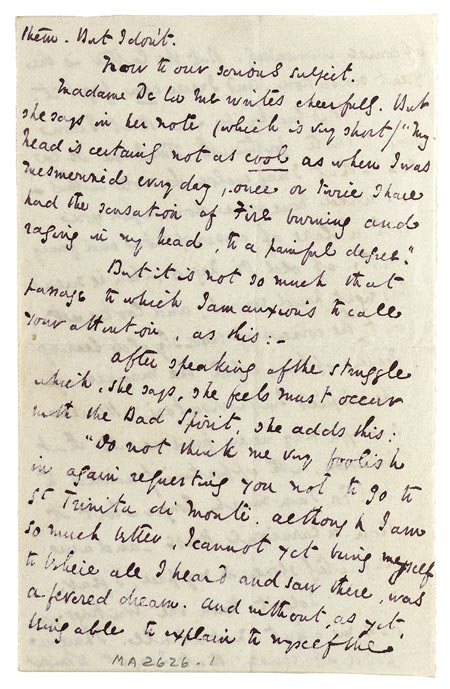
Shortly after his arrival in the United States in January 1842, Dickens told Dr. R. H. Collyer that, "with regard to my opinion on the subject of Mesmerism... I am a believer [but] I became so against all my preconceived opinions and impressions."
While in America, Dickens carried out his first mesmeric experiment on his wife, recalling that he "magnetized [hypnotized] her into hysterics, and then into the magnetic sleep." But his first significant efforts began in Genoa in December 1844, with his mesmeric treatment of Madame Augusta de la Rue. In this letter Dickens informed the husband of Madame de la Rue that she was "now in a state most favorable and advantageous to the best influence The Mesmerism could possibly exert upon her."
Mesmerism
In his life and art, Dickens worked energetically for healing. His fiction exposed many of the social ills of his day, and a significant portion of his later journalism is devoted to an impassioned campaign to improve sanitation and public health. Although he was a committed evolutionist and progressive in his attitude toward science and the improvements wrought by technological advances, he was also, by imagination and temperament, attracted to the fantastic and pseudoscientific. This was manifested in his interest in spontaneous combustion and phrenology as well as his fervent belief and active experiments in mesmerism (or "animal magnetism"), an early type of hypnotism.
Dickens was introduced to mesmerism through Dr. John Elliotson, his family physician and one of his "most intimate and valued friends." He became convinced of the therapeutic effects of mesmerism after witnessing Elliotson's demonstrations in 1838, and, although there is no record of Dickens undergoing the procedure, he learned to mesmerize others. Throughout the 1840s, he conducted mesmeric experiments on his wife and friends.
them. But I don't.
Now to our serious subject.
Madame De la Rue writes cheerfully. But she says in her note (which is very short) "My head is certainly not as cool as when I was mesmerized every day,—once or twice I have had the sensation of Fire burning and raging in my head, to a painful degree."
But it is not so much that passage to which I am anxious to call your attention, as this:—
After speaking of the struggle which, she says, she feels must occur with the Bad Spirit, she adds this:
"Do not think me very foolish in again requesting you not to go to St. Trinita di Monti. Although I am so much better, I cannot yet bring myself to believe all I heard and saw there, was a fevered dream. And without, as yet, being able to explain to myself the
